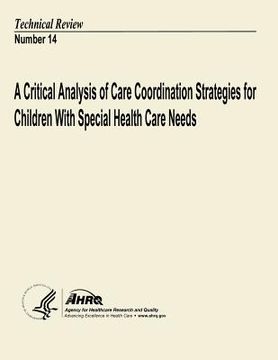A Critical Analysis of Care Coordination Strategies for Children With Special Health Care Needs: Technical Review Number 14 (in English)
Synopsis "A Critical Analysis of Care Coordination Strategies for Children With Special Health Care Needs: Technical Review Number 14 (in English)"
The goal of this technical review is to examine critical issues of care coordination for children with special health care needs. It is intended to supplement the more comprehensive Evidence-based Practice Center (EPC) report on care coordination currently under preparation. Experts in the field such as Perrin and colleagues and Stein have described in detail the requirements for providing coordinated care for children with complex medical needs. In addition, professional organizations such as the American Academy of Pediatrics and a variety of advocacy groups and service programs for families with children with special health care needs have developed care coordination strategies and developed very useful guidance materials regarding this issue. These sources, while embracing general principles of care coordination that are relevant for all populations and age groups, emphasize those elements of care that are of particular importance for children with special health care needs. Although quite varied, they tend to be due to (1) the dependence of children on parents or other adult caretakers; (2) the distinct epidemiology of childhood and its implications for the organization of health services; (3) the developmental nature of child health problems and the need to link care with educational institutions; and (4) the special financial basis for child health and related services. The inherent dependence of children on adults acting on their behalf adds a level of complexity to care coordination efforts in that the facilitation, monitoring, and at times the enforcement of this proxy function must always be incorporated into coordinative programs for children. The most important distinctive characteristic of the epidemiology of childhood is that unlike in the elderly, serious chronic illness is relatively rare. This requires that specialized services for children with such disorders are heavily dependent on regional referral centers, programs that maintain the expertise, volume of patients, and resource commitment to address these serious but relatively rare disorders. The developmental nature of childhood implies that the problems and service needs of children will be highly dynamic over time and involve developmental support services, such as early intervention programs, as well as school-based interactions. Because children are the poorest segment of our population, poverty and means-tested public programs, such as Medicaid, are of particular concern in developing and evaluating care coordination efforts for children. In general, these efforts for improving the coordination of care for children with special health care needs have taken two forms: Specialized care coordination interventions for selected clinical populations. These include the use of case managers, the establishment of a medical home, or home care strategies. The structural organization of health care services. The dominant current approach is managed care. What has generally been lacking is an assessment of the evidence regarding the actual impact of care coordination efforts on outcomes for children with special health care needs. In response, this technical review is directed at the evaluative literature, those published reports that attempt to assess the experience of children with special health care needs and their families in response to purposeful care coordination efforts. Specifically, the technical review addresses the following objectives: 1. To identify and critically examine studies that empirically evaluate models of care coordination interventions for children with special health care needs. 2. To identify and critically examine studies that empirically evaluate the impact of managed care on children with special health care needs, particularly those enrolled in Medicaid. 3. To develop recommendations for future research and the evidence related to potential ameliorative action.

